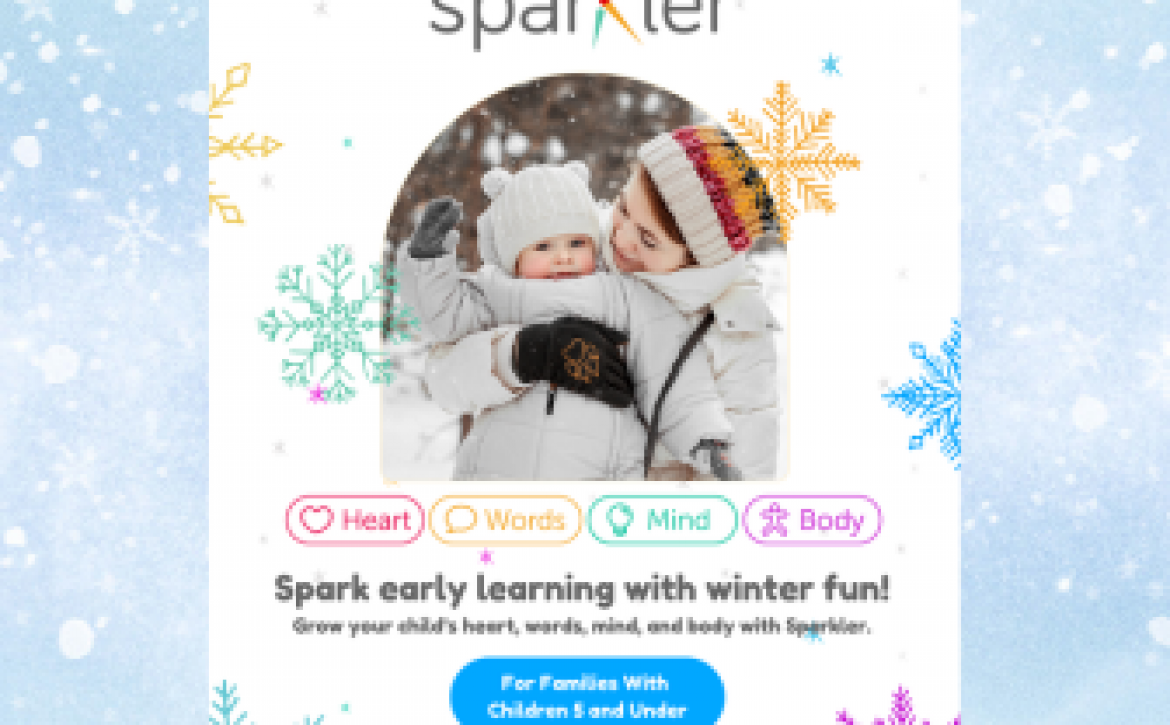New Year, New Goals for Parents & Caregivers
Setting goals is important in all parts of our lives — including parenting and child development — and the start of a new year can be a perfect time to make some resolutions about our parenting and our children’s learning and development. But just like for other types of resolutions (around health and fitness, reading more books, getting organized, etc.), getting a goal to “stick” and lead to accomplishment, isn’t easy.
Here are six steps families can use to establish and achieve goals as we prepare to enter a new year!
Consider Your Top Concerns
Before setting goals, take time to reflect on what matters most to you and your family.
- Are you worried about your child’s early learning and development, social skills, or social and emotional learning? What specific concerns do you have? It can be useful to complete an Ages & Stages Questionnaire (ASQ-3 or ASQ:SE-2 or both) on Sparkler to understand how your child is developing and identify your areas of concern.
- Are you focused on your own parenting habits, such as staying patient during stressful moments or maintaining routines for your family?
Identifying your main concerns will help you focus your energy on goals that will make a difference for your child and your family.
Set a Big (But Achievable) Goal that Addresses Your Concern
Once you’ve identified your concerns, think about what success would look like and how you can set goals that are within your control as a parent. That is, parents cannot control how fast children learn and grow, but parents can control what they — as grown-ups — do or don’t do. The key is to set a goal that feels meaningful and challenging, yet realistic and within your control.
For example:
- Instead of a big goal of “my child will be on track in her gross motor skills,” consider something more specific that you can practice and learn together like: “My child will be able to walk up the stairs in our home.”
- Instead of a big goal of “My child will be able to express himself in full sentences,” consider something that you can control as a parent, such as: “My child and I will communicate better.”
- Instead of a big, broad goal of “I will develop a stronger bond with my child,” consider something that you can control like: “My child and I will spend more time playing together.”
Break Down Your Big Goal into Smaller Goals
Just like going from zero gym visits per week to seven per week overnight can be a recipe for failure, setting a big goal for parenting or child development can also be daunting. The trick that can help you succeed is breaking down the big goal into smaller goals that you can take on, one by one.
Here are some examples, building on the big goals in the previous section:
- Stairs: Smaller goals could be practicing stepping up onto a curb together every day, stepping over a small (1-2 inch) obstacle together, practicing balancing on one foot to a count of three, practicing going up the steps at the playground, etc.
- Communication: Smaller goals could be playing with your child for 10 minutes each day, asking open-ended questions and waiting for your child’s response after reading a book together, or talking with your child while cooking meals or walking to school. If you think your child could benefit from early intervention or other services for speech, you could talk to your healthcare provider and learn about the options.
- Play: Smaller goals could be reading together every day, playing with your child for 10 minutes every day, or trying new “calm down” activities like deep breathing or taking a walk outside together each day.
Achieving these smaller milestones will build momentum toward your larger goal.
Share Your Goals to Get Support from Family, Friends, Teachers, or Others in Your Child's Life
Accountability and encouragement can go a long way in sticking to your goals. Share your plans with trusted members of your “team,” who can provide support and guidance. For example, your child’s teacher might have valuable tips or a spouse or sibling might partner with you in achieving your goals or cheer you on. Involving others also helps create a sense of shared purpose that can help you to achieve your small goals and your big goals.
Measure Your Progress and Reward Yourself for Success
Tracking your progress is essential for staying motivated. Whether it’s using a chart, journal, or app, find a way to measure your achievements. Celebrate small successes along the way to keep the momentum going. Rewards can be as simple as a family movie night or a special outing to the park to recognize everyone’s hard work and dedication.
You Can Do It!
Finally, remind yourself and your family that reaching goals takes time and effort. There will be setbacks, but persistence and a positive attitude make all the difference. Celebrate your growth, even if progress is slower than expected. Every step forward is a victory, and with determination, you can achieve your goals and make this year a memorable one for your family.





